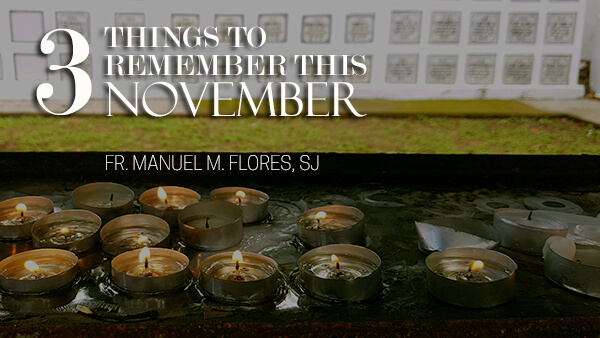


Fr. Manuel M. Flores, SJ
Do you know that the early Christians in the catacombs did exactly what we are doing during our Nov. 1 family gatherings in the cemetery?
Gathering with my family in the cemetery last Nov. 1, I remembered the ancient catacombs of Rome. Rome is the called the eternal city because of its timeless beauty. But thinking of the catacombs of Rome brings one’s thoughts to the edge of eternity.
The catacombs are the underground burial tunnels cut through the soft “tufa” or porous volcanic rock. The pagan Romans and Greeks cremated their dead, but the Jews and Christians buried them. That is why cremation was seen a pagan custom that would only be allowed in the Catholic Church in 1967 for practical reasons.
What did the early Christians do in the catacombs that are so much like what we do today?
First, they remembered the good done by their dead.
On one of the catacombs, on a small marble slab is a Latin inscription “Here lies Lucius. He liked to joke with his brothers. He never quarreled.” It is amazing how we ourselves today spontaneously think about our happy and grateful memories about our beloved dead. The Catholic heart is kind, grateful, and forgiving. Last April, my brother Joseph died. Why is it that all I remember is his kindness, goodness and the happy times we had together? As we meet, feast, and talk about our beloved dead, we convey to them that their faults against us are “forgiven, forgotten, forever.”
Second, they remembered that they will be together in the resurrection.
The early Christians lived at a time not too distant from the last of the apostles. They believed that second coming of Christ and the resurrection were imminent. They wanted their graves near each other so that they can rise from the dead together. Their certainty about the resurrection allowed them to share in the victory, power and joy of the risen Christ even in the midst of the most cruel persecution.
Third, they remembered their dead in their prayer especially in the Eucharist.
They believed in and continued the Jewish practice of praying for the dead (2 Macc 12:38-46). King David himself fasted for the dead; for King Saul and Jonathan (2 Sam 1:12-13). The early Christians even asked the saints to intercede for them as we find inscribed in one catacomb, “Paul and Peter, intercede for Victor”, “Peter and Paul, remember us”
Above all, they saw in the Eucharist the most powerful of all prayers. Pope Sixtus II, was martyred while celebrating the Eucharist in the catacombs. Even today, at every mass, we always remember our beloved dead: “Remember also our brothers and sisters who have fallen asleep in the hope of the resurrection, and all who have died in your mercy: welcome them into the light of your face.” Every mass is a mass for the dead.
To remember their goodness to us;
to remember that we will rise from the dead together;
to remember that every Eucharist is a powerful prayer for our beloved dead:
these are the 3 things to remember this November.
The month of November has been designated by the Holy Mother the Church, as a time of prayer and good works on behalf of our beloved dead, imploring our Heavenly Father to bring them home to be with Him forever. Every day during November, the Philippine Jesuits through the Philippine Jesuit Aid Association will remember those you recommend to us in our masses, in our prayers and in our apostolic labors. Support the November Souls Drive. For more information, click here.